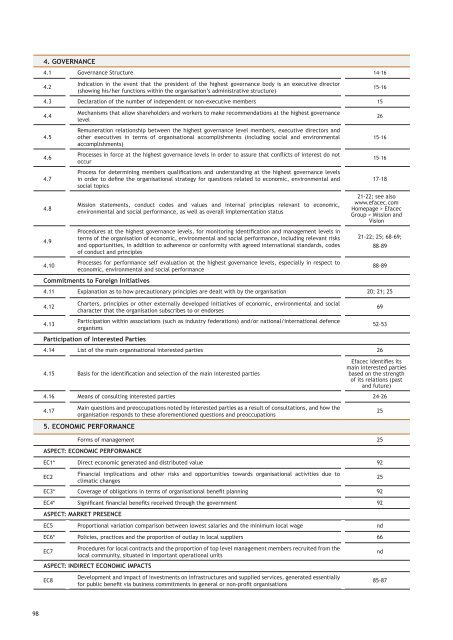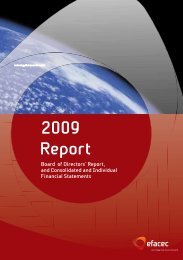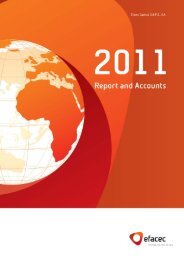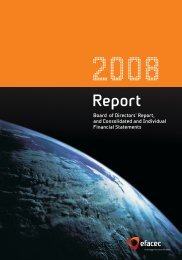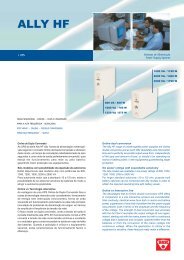Relatorio de gestao_2010_INGLES.indd - Efacec
Relatorio de gestao_2010_INGLES.indd - Efacec
Relatorio de gestao_2010_INGLES.indd - Efacec
Create successful ePaper yourself
Turn your PDF publications into a flip-book with our unique Google optimized e-Paper software.
98<br />
4. GOVERNANCE<br />
4.1 Governance Structure 14-16<br />
4.2<br />
Indication in the event that the presi<strong>de</strong>nt of the highest governance body is an executive director<br />
(showing his/her functions within the organisation’s administrative structure)<br />
4.3 Declaration of the number of in<strong>de</strong>pen<strong>de</strong>nt or non-executive members 15<br />
4.4<br />
4.5<br />
4.6<br />
4.7<br />
4.8<br />
4.9<br />
4.10<br />
Mechanisms that allow sharehol<strong>de</strong>rs and workers to make recommendations at the highest governance<br />
level<br />
Remuneration relationship between the highest governance level members, executive directors and<br />
other executives in terms of organisational accomplishments (including social and environmental<br />
accomplishments)<br />
Processes in force at the highest governance levels in or<strong>de</strong>r to assure that confl icts of interest do not<br />
occur<br />
Process for <strong>de</strong>termining members qualifi cations and un<strong>de</strong>rstanding at the highest governance levels<br />
in or<strong>de</strong>r to <strong>de</strong>fi ne the organisational strategy for questions related to economic, environmental and<br />
social topics<br />
Mission statements, conduct co<strong>de</strong>s and values and internal principles relevant to economic,<br />
environmental and social performance, as well as overall implementation status<br />
Procedures at the highest governance levels, for monitoring i<strong>de</strong>ntifi cation and management levels in<br />
terms of the organisation of economic, environmental and social performance, including relevant risks<br />
and opportunities, in addition to adherence or conformity with agreed international standards, co<strong>de</strong>s<br />
of conduct and principles<br />
Processes for performance self evaluation at the highest governance levels, especially in respect to<br />
economic, environmental and social performance<br />
Commitments to Foreign Initiatives<br />
15-16<br />
26<br />
15-16<br />
15-16<br />
17-18<br />
21-22; see also<br />
www.efacec.com<br />
Homepage > <strong>Efacec</strong><br />
Group > Mission and<br />
Vision<br />
21-22; 25; 68-69;<br />
88-89<br />
4.11 Explanation as to how precautionary principles are <strong>de</strong>alt with by the organisation 20; 21; 25<br />
4.12<br />
4.13<br />
Charters, principles or other externally <strong>de</strong>veloped initiatives of economic, environmental and social<br />
character that the organisation subscribes to or endorses<br />
Participation within associations (such as industry fe<strong>de</strong>rations) and/or national/international <strong>de</strong>fence<br />
organisms<br />
Participation of Interested Parties<br />
4.14 List of the main organisational interested parties 26<br />
4.15 Basis for the i<strong>de</strong>ntifi cation and selection of the main interested parties<br />
<strong>Efacec</strong> i<strong>de</strong>ntifi es its<br />
main interested parties<br />
based on the strength<br />
of its relations (past<br />
and future)<br />
4.16 Means of consulting interested parties 24-26<br />
4.17<br />
Main questions and preoccupations noted by interested parties as a result of consultations, and how the<br />
organisation responds to these aforementioned questions and preoccupations<br />
5. ECONOMIC PERFORMANCE<br />
Forms of management 25<br />
ASPECT: ECONOMIC PERFORMANCE<br />
EC1* Direct economic generated and distributed value 92<br />
EC2<br />
Financial implications and other risks and opportunities towards organisational activities due to<br />
climatic changes<br />
25<br />
EC3* Coverage of obligations in terms of organisational benefi t planning 92<br />
EC4* Signifi cant fi nancial benefi ts received through the government 92<br />
ASPECT: MARKET PRESENCE<br />
EC5 Proportional variation comparison between lowest salaries and the minimum local wage nd<br />
EC6* Policies, practices and the proportion of outlay in local suppliers 66<br />
EC7<br />
Procedures for local contracts and the proportion of top level management members recruited from the<br />
local community, situated in important operational units<br />
ASPECT: INDIRECT ECONOMIC IMPACTS<br />
EC8<br />
Development and impact of investments on infrastructures and supplied services, generated essentially<br />
for public benefi t via business commitments in general or non-profi t organisations<br />
88-89<br />
69<br />
52-53<br />
25<br />
nd<br />
85-87


